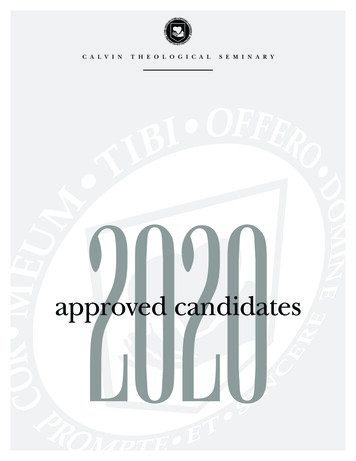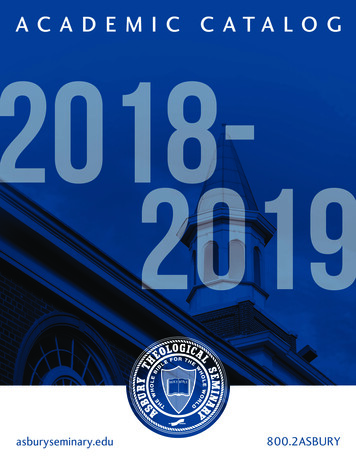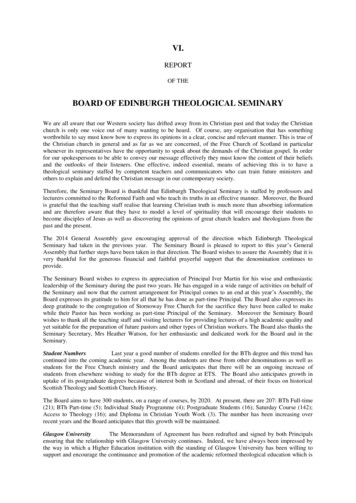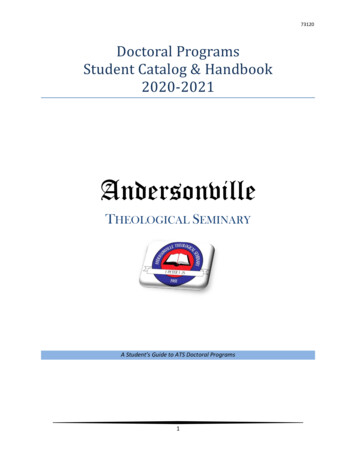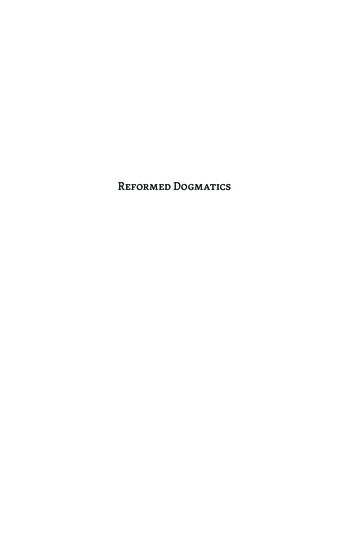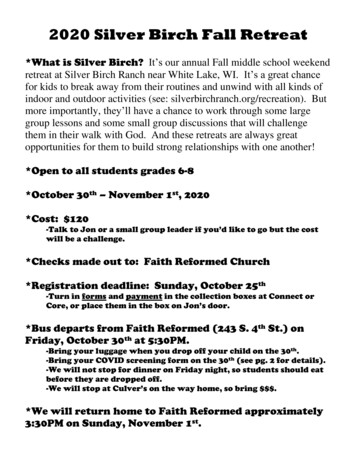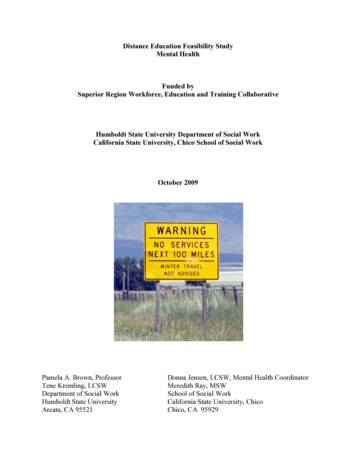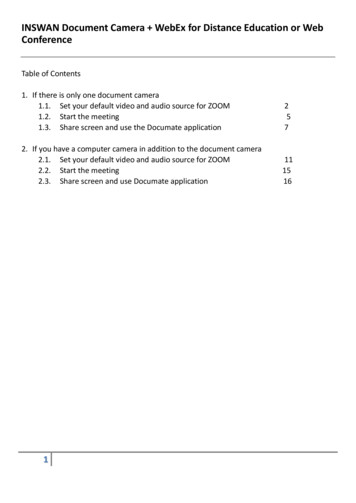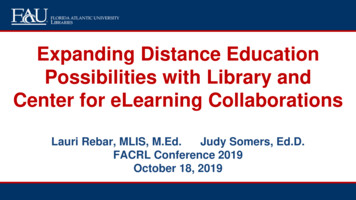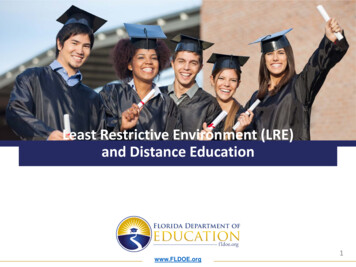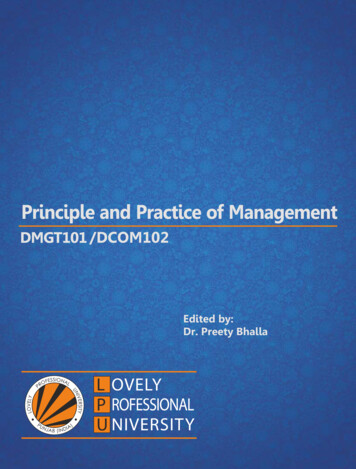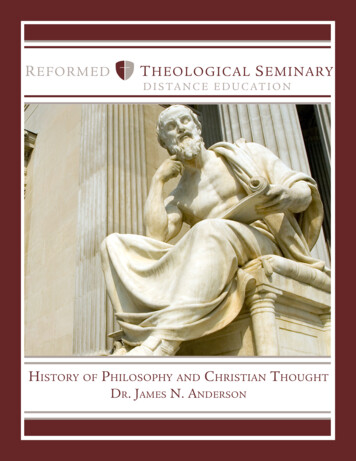
Transcription
R EFORMEDT HEOLOGICAL S EMINARYDISTANCE EDUCATIONHistory of Philosophy and Christian ThoughtDr. James N. Anderson10ST504 - History of Philosophy and Christian Thought - 3 hours - Dr. James N. Anderson 2016 - Reformed Theological Seminary, Distance Education
Course OverviewTable of Contents:Course OverviewGradesRequired TextbooksLessonsMeet the ProfessorResearch Paper InstructionsStudent Learning ObjectivesCourse Description:0ST504 History of Philosophy and Christian Thought, 3 hoursLecturing Professor and Professor of Record:Dr. James N. AndersonA critical, historical survey of the development of the main schools of philosophy andthe principle developments in Christian doctrine and thought. After a brief introduction tophilosophical thinking, the course concentrates on philosophical movements from Heraclitus tocontemporary existentialism. Each school of thought is evaluated from a distinctively Reformedperspective.Course Objectives: To familiarize the student with some of the major movements, figures, and texts inthe history of Western philosophy, both Christian and non-Christian To introduce the student to the “big ideas” that have dominated philosophical debatesover the centuries and their significance for Christian theology and apologetics To encourage the student to analyze the history of Western thought in terms ofconflicting worldviews; and more specifically, in terms of deviations from the biblicalworldview To develop the student’s critical thinking skills through the close reading and analysisof primary sources To help the student to appreciate the importance and utility of philosophical thinkingRequired Textbooks:Frame, John M. A History of Western Philosophy and Theology. Phillipsburg, NJ: P&R, 2015. “How to Write a Theological Paper,” Appendix F in The Doctrine of the Knowledgeof God. Phillipsburg: P&R, 1987.[A copy of this will be made available on the LMS Course Home Page.]Various primary source readings that will be distributed to the student in the LearningManagement System (LMS).[These books may also be available in ebook format through various retailers]20ST504 - History of Philosophy and Christian Thought - 3 hours - Dr. James N. Anderson 2016 - Reformed Theological Seminary, Distance Education
Online Student Handbook:The Online Student Handbook has been designed to assist you in successfully navigating theDistance Education experience, whether you are taking a single course or pursuing a certificateor degree program. In it you will find valuable information, step-by-step instructions, studyhelps, and essential forms to guide you through every aspect of your distance educationopportunity from registration to graduation. Please use this resource as your first-stopreference manual.Summary of Requirements:1. Listen to all recorded Lectures2. Complete all Readings3. Participate in Forum Discussions (with other students and the professor)4. Take the Midterm Exam5. Take the Final Exam6. Submit Research Paper7. Submit Reading Requirement8. Submit Mentor Report or Course Application Paper30ST504 - History of Philosophy and Christian Thought - 3 hours - Dr. James N. Anderson 2016 - Reformed Theological Seminary, Distance Education
Meet the ProfessorLecturing Professor and Professor of Record:Dr. James Anderson is an ordained minister in the AssociateReformed Presbyterian Church. Dr. Anderson came to RTS fromEdinburgh, Scotland, and specializes in philosophical theology,religious epistemology, and Christian apologetics. His doctoral thesisat the University of Edinburgh explored the paradoxical nature ofcertain Christian doctrines and the implications for the rationalityof Christian faith. His research and writing has also focused on thepresuppositionalism of Cornelius Van Til, particularly his advocacyof the transcendental argument. Dr. Anderson has a longstandingconcern to bring the Reformed theological tradition into greaterdialogue with contemporary analytic philosophy. Before studyingphilosophy, Dr. Anderson also earned a Ph.D. in Computer Simulationfrom the University of Edinburgh. He is a member of the Society of Christian Philosophers, theBritish Society for the Philosophy of Religion, and the Evangelical Philosophical Society. Priorto joining RTS Charlotte, Dr. Anderson served as an assistant pastor at the historic CharlotteChapel in Edinburgh where he engaged in regular preaching, teaching, and pastoral ministry.He is active now in service at Ballantyne Presbyterian Church in Charlotte. He is married toCatriona and they have three children. You can follow his blog at www.proginosko.com or onTwitter @proginoskoSelected Publications by Dr. AndersonParadox in Christian Theology: An Analysis of Its Presence, Character, and Epistemic Status. PaternosterTheological Monographs. Eugene, OR: Wipf and Stock, 2007.What’s Your Worldview?: An Interactive Approach to Life’s Big Questions. Wheaton, IL: Crossway,2014.“The Lord of Noncontradiction: An Argument for God from Logic” co-authored with GregWelty, Philosophia Christi 13:2. 2011.Review of Analytic Theology: New Essays in the Philosophy of Theology edited by Oliver Crisp andMichael Rea, Ars Disputandi 11. 2011.“No Dilemma for the Proponent of the Transcendental Argument: A Response to DavidReiter,” Philosophia Christi 13:1 2011.Review of The Reformed Objection to Natural Theology by Michael Sudduth, Themelios 35:2 2010.40ST504 - History of Philosophy and Christian Thought - 3 hours - Dr. James N. Anderson 2016 - Reformed Theological Seminary, Distance Education
GradesForum Discussions (15%):The student is required to interact in two (2) forums:1. Student-Professor Posts (15 total posts)A. Personal Introduction Forum: The student is required to post a brief personalintroduction to the professor/class. Suggested details include your vocation,where you live, your church background, why you chose RTS, and what youhope to gain through the course (1 required post).B. 5 Topical Discussion Q&A Forums: The student is required to answereach topical discussion question with one (1) response. The professor willacknowledge the student’s answer and will follow up with a subsequent questionto which the student must also answer with one (1) response. Each topicaldiscussion question, therefore, requires two (2) total posts/responses from thestudent (Total of 5 forums x 2 posts 10 total posts).C. Student-Professor Forum: The student is required to post four (4) times inthis forum. Posts in this forum should focus on course-related content suchas research paper topics, lectures and reading assignments, or other academicissues related to the course.2. Student-Student Forum (5 total posts)A post may be either a new topic or a response to an already existing topic.Examinations (Midterm 20%, Final 30%):There are two examinations for this course. The midterm exam will cover lessons 1-6.The format of the exam will be a series of multiple-choice questions based on the materialcovered to date. Use the Lesson Questions to assist you in your study. You will have one hourto complete the exam.The final exam will be cumulative covering all lessons, 1-15. You should review all ofthe class material and all of the required reading in preparation for the exam. Use the LessonQuestions to assist you in your study. The format for the final exam will be a series of ten (10)short essay questions in which you are required to choose three (3) to respond to. Responsesshould be approximately five paragraphs (500 words) in length. You have three hours to completethe exam.The midterm and final exams for this course are to be taken online in the LMS. Pleasenote that you will need to have a proctor for your exams. Your proctor can by anyone excepta relative or current RTS Student. After clicking on the exam link you will be given detailedinstructions about the exam. Please read these instructions carefully before entering the exam.Research Paper (25%):The student will write a paper 3500–4500 words, excluding footnotes that discusses oneof the thinkers covered in class who took a distinctive position on one major philosophical issue.See section titled “Research Paper Instructions” in this syllabus.50ST504 - History of Philosophy and Christian Thought - 3 hours - Dr. James N. Anderson 2016 - Reformed Theological Seminary, Distance Education
Reading Report (5%):The student must complete all of the required reading. Reading assignments are brokendown week by week within the LMS. The Reading Report will indicate the amount of requiredreading that has been completed during the semester and must be filled out and submitted atthe end of the course.Mentor Report OR Course Application Paper (5%):If you are enrolled in an RTS Global degree program, you are required to submit a mentorreport at the end of the course. Every portion of the form (goals, summaries, assessments, andsignatures) should be filled out completely by both the student and the mentor to receive fullcredit. You can download the Mentor Report form in your Canvas classroom.If you are receiving your degree through another RTS campus (Orlando, Jackson, Charlotte,et. al.), or are a certificate student, or special student (e.g. from another seminary), you are askedto write a 200-word summary of how you perceive what you have learned in this course will fitinto the objectives you have for your ministry, your educational goals, or other objectives youwish to achieve in life. Course Application Papers (CAP) that fall well-short of 200 words willreceive a grade deduction.Assignments:Best practice for your time management is for you to submit all assignments at the endof the week in which they fall, using the upload links provided in the LMS. All work must besubmitted by midnight of the course end date, per your course start letter. You are responsiblefor turning in all assignments on time; no late submissions are permitted. Any student whoneeds an extension must get approval from the Registrar prior to that time.Contact Information:Reformed Theological Seminary, Distance Education2101 Carmel RoadCharlotte, NC 28226(704) 900-12571-855-854-6920FAX: (704) 366-9295E-mail: dess@rts.eduWeb site: www.rts.edu/global60ST504 - History of Philosophy and Christian Thought - 3 hours - Dr. James N. Anderson 2016 - Reformed Theological Seminary, Distance Education
LessonsLesson OneLesson TwoIntroduction to Philosophy and WorldviewsThe First PhilosophersLesson ThreeThe Big ThreeLesson FourLate Greek PhilosophyLesson FiveEarly Christian PhilosophyLesson SixMedieval PhilosophyLesson SevenThe Renaissance and The ReformationLesson EightEarly Modern PhilosophyPart I - Continental RationalismLesson NineEarly Modern PhilosophyPart II - British EmpiricismLesson TenThe ApologistsLesson ElevenLate Modern PhilosophyPart I - Idealism and Anti-IdealismLesson TwelveLate Modern PhilosophyPart II - ExistentialismLesson ThirteenAnalytic PhilosophyLesson FourteenPostmodern PhilosophyLesson FifteenTwentieth-Century Christian Philosophy70ST504 - History of Philosophy and Christian Thought - 3 hours - Dr. James N. Anderson 2016 - Reformed Theological Seminary, Distance Education
Research Paper InstructionsThe student will write a paper 3500–4500 words, excluding footnotes, that discusses oneof the thinkers covered in class who took a distinctive position on one major philosophicalissue.Here are some examples, but feel free to formulate your own:1.2.3.4.5.6.Leibniz, Hume, or Plantinga on the existence of GodAristotle, Aquinas, or Descartes on the nature of the soulHobbes, Locke, or Berkeley on the reality of matterPlato, Ockham, or Derrida on the reality of universalsAugustine, Hegel, or Marx on the goal of historyKant, Van Til, or Rorty on the possibility of knowledgeThe paper should include detailed interaction with at least one primary source from yourchosen thinker. It should also make use of a good number of secondary sources and includeall of the following:1.2.3.4.5.6.A concise explanation of the philosophical issue in question.An exposition of the position on the issue taken by your chosen thinker and hisreasons for taking that position, with reference to your primary sources. You shouldalso indicate how this thinker’s views were influenced by his historical context.A critical evaluation of that position in light of both reason and Scripture.An explanation of your own position on the issue (compared and contrasted withthat of your chosen thinker).A brief discussion of the significance of the philosophical issue in question forChristian doctrine or practice.A standard bibliography (see below on sources and citations).At least eight (8) scholarly sources should be cited. For the purposes of this paper, a scholarly source is a book or article by a recognizedexpert in the field (and not aimed at a popular level for a general audience)—ideallyone that has been peer-reviewed. Wikipedia is clearly not a scholarly source. That said, with sufficient discernment, Wikipedia can be a useful pointer toscholarly sources and is generally reliable for fact-checking on noncontroversialissues. Please consult me if you have any doubts about whether a source is scholarly. You should not rely heavily on Internet sources. Use the library!The paper should be word-processed, not hand-written. Use a 12-point font and double line-spacing for the main text.80ST504 - History of Philosophy and Christian Thought - 3 hours - Dr. James N. Anderson 2016 - Reformed Theological Seminary, Distance Education
Use section headings where applicable to improve readability.Use footnotes (10-point font) rather than endnotes.Use the guidelines in the current edition of A Manual for Writers of Term Papers,Theses, and Dissertations, by Kate L. Turabian.The paper should be submitted with a title page containing all of the following:1.2.3.4.The name and year of the course;Your name; the professor’s name;The title of the paper; andThe exact word count for the main text of the paper (obtained from your wordprocessor’s word-count feature).You will be penalized if you do not observe the requirements and guidelines above.The following rubric contains some of the key criteria by which your paper may be graded:1. Clear & Viable Thesis: The paper puts forth a viable thesis that is clearly statedand can be reasonably defended in a paper of the assigned length.2. Structure & Argumentation: The paper has a logical structure and providesappropriate argumentation in support of the thesis.3. Use of Resources: The paper uses the proper number and types of resources. Thisincludes using diverse, quality resources in a responsible manner.4. Turabian Formatting: The paper is properly formatted according to the RTSTurabian guidelines. These guidelines can be downloaded within your course onthe “Notebook” page.5. Depth of Paper: The paper has depth that reflects scholarly research, criticalanalysis, theological insight, and creativity.6. Presentation of Paper: The paper reflects good grammar, spelling, andpunctuation, with clarity of expression and appropriate academic style.90ST504 - History of Philosophy and Christian Thought - 3 hours - Dr. James N. Anderson 2016 - Reformed Theological Seminary, Distance Education
REFORMEDTHEOLOGICAL SEMINARYSYSTEMCourse Objectives Related to MAR Student Learning OutcomesCourse:Professor:History of Philosophy and Christian ThoughtDr. James N. AndersonMAR Student Learning OutcomesIn order to measure the success of the MAR curriculum, RTS hasdefined the following as the intended outcomes of the student learningprocess. Each course contributes to these overall outcomes. This rubricshows the contribution of this course to the MAR outcomes.Articulation(oral & ire forWorldviewWinsomelyReformedTeachChurch/WorldMAR SpecificSLOBroadly understands and articulates knowledge,both oral and written, of essential biblical,theological, historical, and cultural/globalinformation, including details, concepts, andframeworks.Significant knowledge of the original meaningof Scripture. Also, the concepts for and skillto research further into the original meaning ofScripture and to apply Scripture to a variety ofmodern circumstances. (Includes appropriateuse of original languages and hermeneutics; andintegrates theological, historical, and cultural/global oneModerateModerateSignificant knowledge of Reformed theologyand practice, with emphasis on the WestminsterStandards.MinimalDemonstrates a love for the Triune God that aidsthe student’s sanctification.MinimalBurning desire to conform all of life to the Wordof God.StrongMini-Justification1. Critical review/application paper2. Final exam tests knowledge andarticulation of course topics3. Class discussion questions testingunderstanding and application1. Evaluates philosophical ideas andmovements in light of Scripture2. Influences on modern hermeneutics3. Discusses different approaches toScripture in history of Christian thought1. Evaluates philosophical ideas fromReformed perspective2. Discusses Reformation asintellectual/cultural movement1. Encourages application of Matthew22:37 (“with all your mind”)1. Emphasizes understanding andapplication of biblical worldview2. Discusses philosophical implicationsof biblical worldview3. Christian worldview contrasted withnon-Christian worldviewsEmbraces a winsomely Reformed ethos.(Includes an appropriate ecumenical spirit withother Christians, especially Evangelicals; aconcern to present the Gospel in a God-honoringmanner to non-Christians; and a truth-in-loveattitude in disagreements.)1. Appreciation for insights from nonReformed traditions and non-Christianphilosophies (common grace)2. Application of philosophical criticismto apologetics and evangelismModerateAbility to teach the meaning of Scripture to bothheart and mind with clarity and enthusiasm.Minimal1. Understanding modernism andpostmodernism aids preaching andteaching in 21st centuryAbility to interact within a denominational context,within the broader worldwide church, and withsignificant public issues.MinimalAppreciation for breadth ofChristian philosophical traditionAn ability to integrate such knowledge andunderstanding into one’s own calling in societyMinimalUnderstanding modernism andpostmodernism helps diagnoseintellectual problems for 21st centuryChristians100ST504 - History of Philosophy and ChristianxiiiThought - 3 hours - Dr. James N. Anderson 2016- ReformedTheologicalSeminary,- Dr.DistanceHistoryof PhilosophyandChristian ThoughtJamesEducationN. Anderson
Edinburgh, Scotland, and specializes in philosophical theology, religious epistemology, and Christian apologetics. His doctoral thesis at the University of Edinburgh explored the paradoxical nature of certain Christian doctrines and the implications for the rationality of Christia
